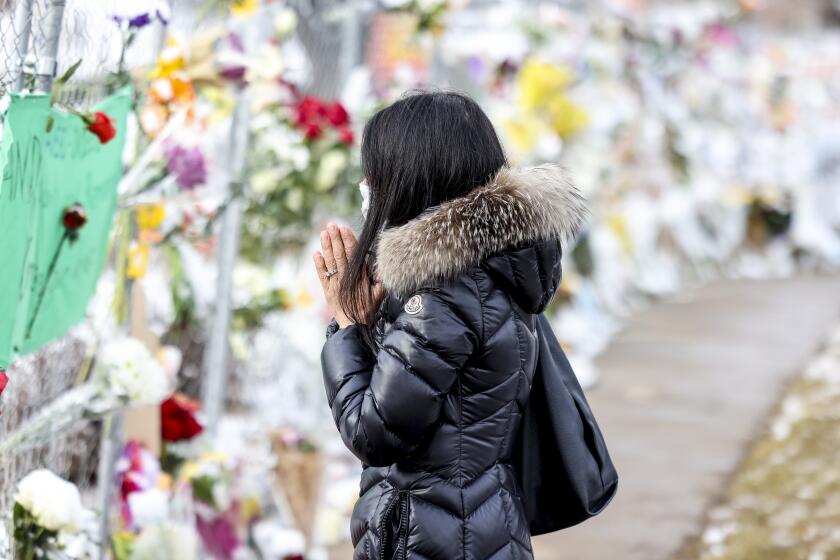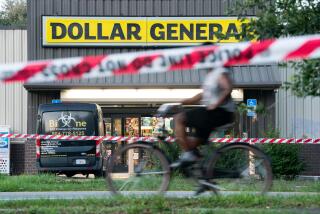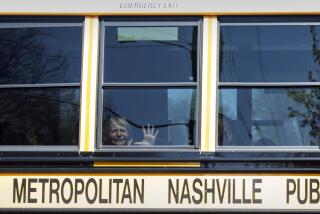As pandemic recedes, mass shootings again jolt America
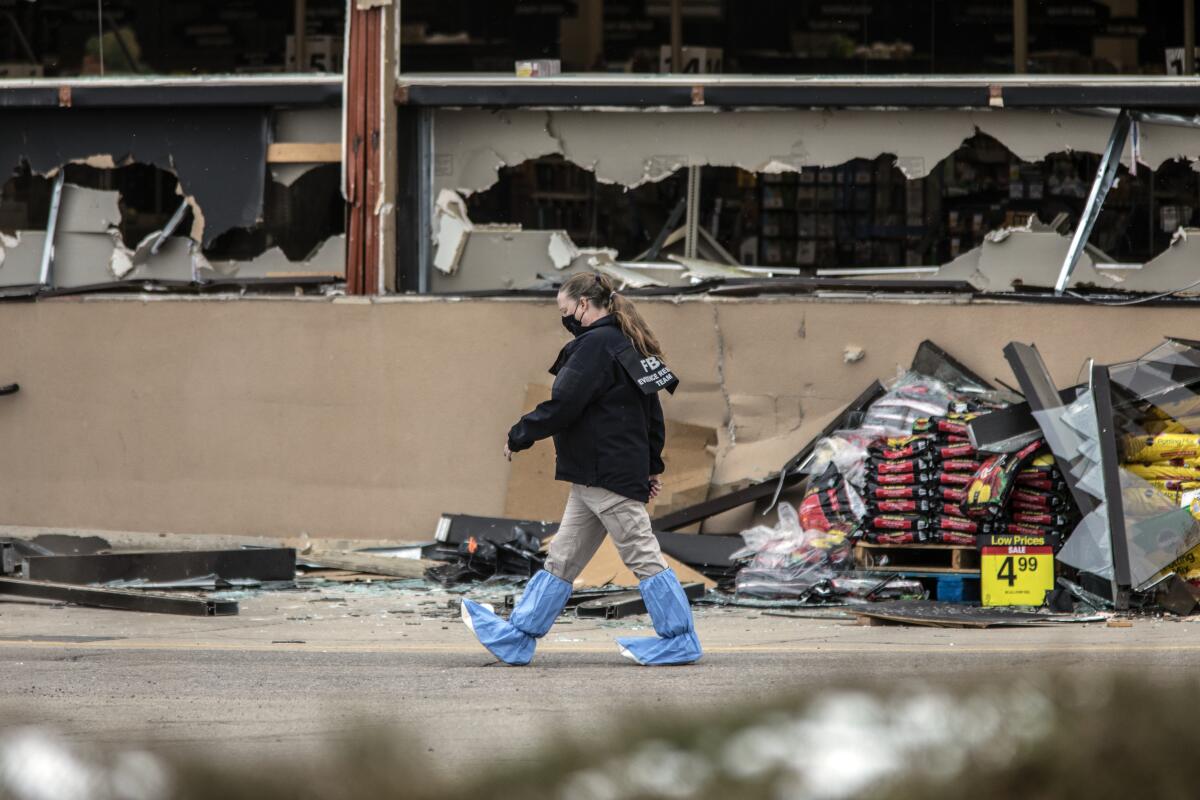
- Share via
For a moment, it seemed as if American life might be returning, however haltingly, to normal. Then the sickening jolt of recognition: This is our normal.
With two mass shootings separated by a span of just six days, the sense of hope that blossomed amid quickening COVID-19 vaccinations across the country is giving way to a communal sense of dismay and dread. We are emerging from our pandemic lockdowns to images of SWAT teams and bloodied bodies that once gripped the country with stunning regularity.
That Monday’s shooting unfolded in a supermarket — a place that endured, stayed open and sustained families through months of isolation — is a stark expression of vulnerability in a nation long accustomed to burying those felled by gun violence.
There is an added psychological burden when an acute trauma, such as a shooting, occurs in the midst of chronic stress like a global pandemic, said Emanuel Maidenberg, a psychiatrist at UCLA who studies panic, depression and coping amid disasters.
“Emotional reactions to horrific events — fear, anger, frustration, helplessness — these are normal responses to a mass shooting in ordinary times,” he said. “But in the pandemic context, we’ve been operating with an elevated baseline level of stress for quite some time.”
Gun violence on this scale — eight dead in and near Atlanta last week, 10 in Boulder this week — is, in the developed world, a uniquely American phenomenon. Once again, peer countries, some staggering under their own pandemic burdens, look our way with pity and bewilderment.
The shootings, with a 21-year-old man charged in each, ignited the familiar national tinderbox of ethnicity, misogyny and religious faith. And as during these deadly months of COVID-19, grief is bound up with political argumentation: We can’t agree on the meaning of these deaths.
“This is not, and should not be, a partisan issue,” said President Biden. “It is an American issue.”
A shooting at a Colorado supermarket Monday killed 10 people, including a police officer, and a suspect was in custody, authorities said.
But just as mask-wearing to stem the spread of COVID-19 became a cultural signifier during the last year, the availability of assault weapons and handguns is a perennial fault line, with urgent necessities of public safety pitted against long-held notions of personal liberty.
Asian Americans have been confronting a fear of violence since the start of the pandemic, said Yale sociologist Grace Kao. The shootings at three Atlanta-area massage spas, with six Asian women among the dead, reinforced that overarching sense of peril.
Now, just as many Americans feel safe enough to reengage with their own lives — visit the spa, pick up groceries for dinner — they, too, are being reminded that nowhere is truly safe.
“Having a vaccine gives a sense of security that you can venture outside again, but these are risks that you’re only going to confront outside your home,” said Kao. “People are already on edge, and rightly. I don’t see why the frequency of mass shootings in America before the pandemic will look any different once it passes.”
In Boulder, the very normality of the setting was disorienting: a sprawling supermarket filled with shoppers loading up the pantry for the week or grabbing a quick snack. As during the worst days of the pandemic, the mundane turned suddenly terrifying — the weight of mortality, stumbled upon in the produce aisle, or lurking by the marked-down laundry detergent.
The larger tragedy of the last year intertwined with the more intimate scale of the shootings. Denny Stong, 20, the youngest of those killed in Boulder, alluded on his Facebook page to the pride he took in working at the supermarket through the pandemic.
“I can’t stay home,” the border of his profile picture read. “I am a grocery store worker.”
Like the more than 543,000 U.S. deaths from COVID-19, the staggering toll of periodic mass shootings in the United States can also feel like something of an abstraction. After the tribulations of the last year, this spasm of gun violence is a fresh horror at a time when many people feel all but bereft of emotional resources.
The fresh shootings aroused those of recent memory, especially in Colorado: Columbine, Aurora and a Planned Parenthood clinic in Colorado Springs.
“I feel numb,” said Maris Herold, Boulder’s police chief, and many Americans understood.
Over 25 years, the Denver suburbs have seen a string of mass shootings — in supermarkets, schools, a movie theater, a Planned Parenthood clinic.
The pandemic, while robbing so many of so much, coincided with a decline in mass shootings to the lowest levels in nearly a decade. But somehow that respite made the resurgence of gun violence all the more shocking and painful — one plague at last receding, only to be replaced by another.
For years, mass shootings have been such a fixture in American public life that victims tend to behave as if it’s a movie they’ve seen before. Those who found themselves trapped in the King Soopers in Boulder told of almost instinctively recognizing the dread significance of successive, percussive bangs, of silencing their phones as they hid, of raising their hands unbidden when help arrived.
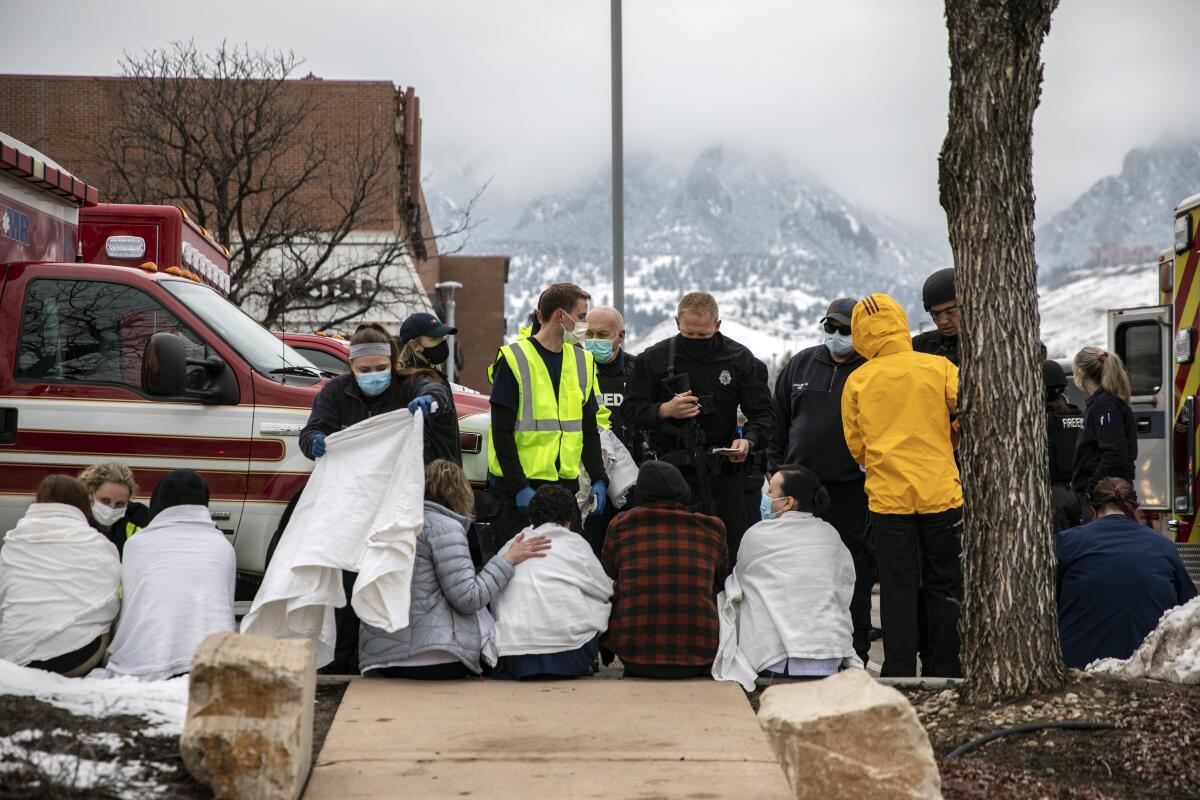
The heartbreaking and ordinary details of the shooting victims’ lives, like those of the hundreds of thousands who died in the pandemic, are now coming to light, yet another act in a peculiarly American passion play. Like those last week in the Atlanta area, friends and family of the 10 dead in Boulder, who ranged in age from 20 to 65, are picking up the sorrowful litany of what was lost.
In recent days, the narrative surrounding the coronavirus outbreak has been one of unaccustomed hope. More than a quarter of the U.S. population has received at least one dose of a vaccine, according to the Centers for Disease Control and Prevention. More than 13% are fully vaccinated.
The staccato pace of the tragedies, echoing the fusillade of gunfire, can leave little time to absorb their full import. Last week, Biden ordered flags to be flown at half-staff at the White House to honor the Atlanta-area victims. That order expired at sunset on Monday — the day of the Boulder shooting.
Now they have been lowered again.
King reported from Washington and Baumgaertner from Los Angeles.
More to Read
Sign up for Essential California
The most important California stories and recommendations in your inbox every morning.
You may occasionally receive promotional content from the Los Angeles Times.
